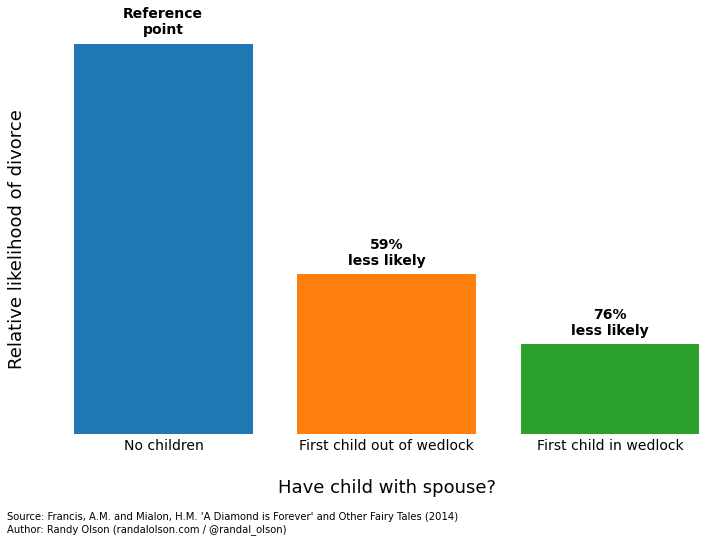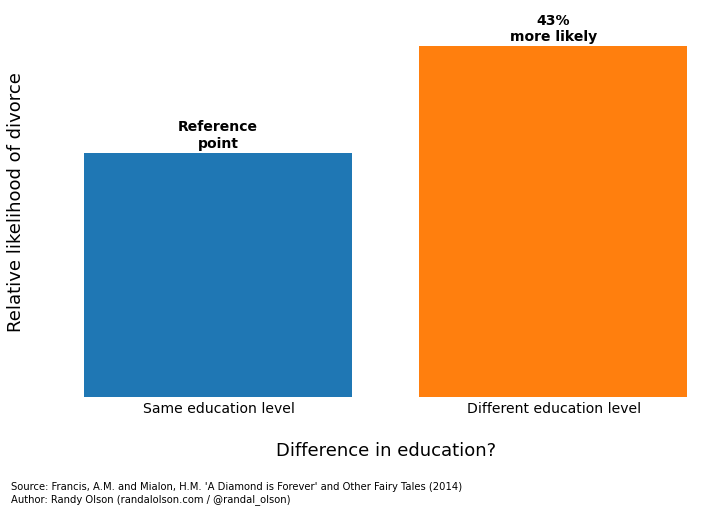What makes for a stable marriage? Part 2
Published on November 07, 2014 by Dr. Randal S. Olson
dating divorce marriage relationships usa wedding
4 min READ
About a decade ago, the gossip on everyone's lips was that "1/2 of all marriages in the U.S. end in divorce." That factoid was later disproven, but it left a lasting impression on the eligible bachelors and bachelorettes of America. In an effort to not become a part of that statistic, I started doing a little research on what makes for a stable marriage in America.
Last month, I ran across an interesting study on divorce titled 'A Diamond is Forever' and Other Fairy Tales: The Relationship between Wedding Expenses and Marriage Duration. The authors of this study polled thousands of recently married and divorced Americans (married 2008 or later) and asked them dozens of questions about their marriage: How long they were dating, how long they were engaged, etc. After running this data through a multivariate model, the authors were able to calculate the factors that best predicted whether a marriage would end in divorce.
What struck me about this study is that it highlighted about a dozen predictors that correlate with stable or unstable marriages in the U.S. By popular demand, I've highlighted 3 more of the biggest factors below as a follow-up to Part 1. I highly recommend checking the study out yourself (linked above) to look at all of them.
First, I'll orient you on how to read these graphs. The authors always chose one category as the "reference point." That means that all of the other categories are compared to that category. Below for example, "59% less likely" means that couples who had a child before their engagement were 59% less likely to ultimately end up divorced than couples who did not have a child.
Having children with your spouse
We all know someone who was on the verge of a breakup or divorce until they announced that they were having a baby with their spouse. According to this study, having a baby with your spouse can decrease your chances of divorce by as much as 76% compared to couples who do not have children. Of course, having children within wedlock -- another telltale sign of a well-planned marriage -- reduces your chances of divorce moreso than having children before you tie the knot.
What's particularly interesting, though, is that even having children out of wedlock still reduces your long-term chances of divorce. It seems that shotgun weddings are more stable than we would expect them to be!
Being the same age as your spouse
Perhaps unsurprisingly, the larger the age gap between you and your partner, the more likely your marriage will end in divorce. Only being 1-5 years away from your partner is nothing to worry about, but if you're old enough to be your partner's parent, then your marriage might be in trouble.
Hugh Hefner, anyone?
Note: A previous version of this article showed a chart giving specific relative percent likelihoods of divorce occurring based on number of years married. The original authors of the study have pointed out that although there is a significant correlation between wider age gaps and increased divorce, it is not possible to determine the relative percent likelihood from their study. That is left to future research.
Having the same education level as your spouse
If you're a PhD marrying a high school dropout, your marriage may be shakier than a marriage between two college graduates. It's particularly interesting to note that the education difference matters more for women than men: Women are 50% more likely to end up divorced when there is an education difference versus men at only 32% more likely.
Important: correlation != causation
Of course, it's important for us to keep in mind that these are all correlations with marriage stability, and they could be telling us any number of things. For example, the "having kids with your spouse" correlation could go either way: Either people in stabler marriages are more likely to have kids in wedlock, or people in less stable (unhappy) marriages tend not to have kids. All of the explanations I wrote above are my own interpretations of the correlations, but keep an open mind when thinking about what could really be driving these correlations with marriage stability.

